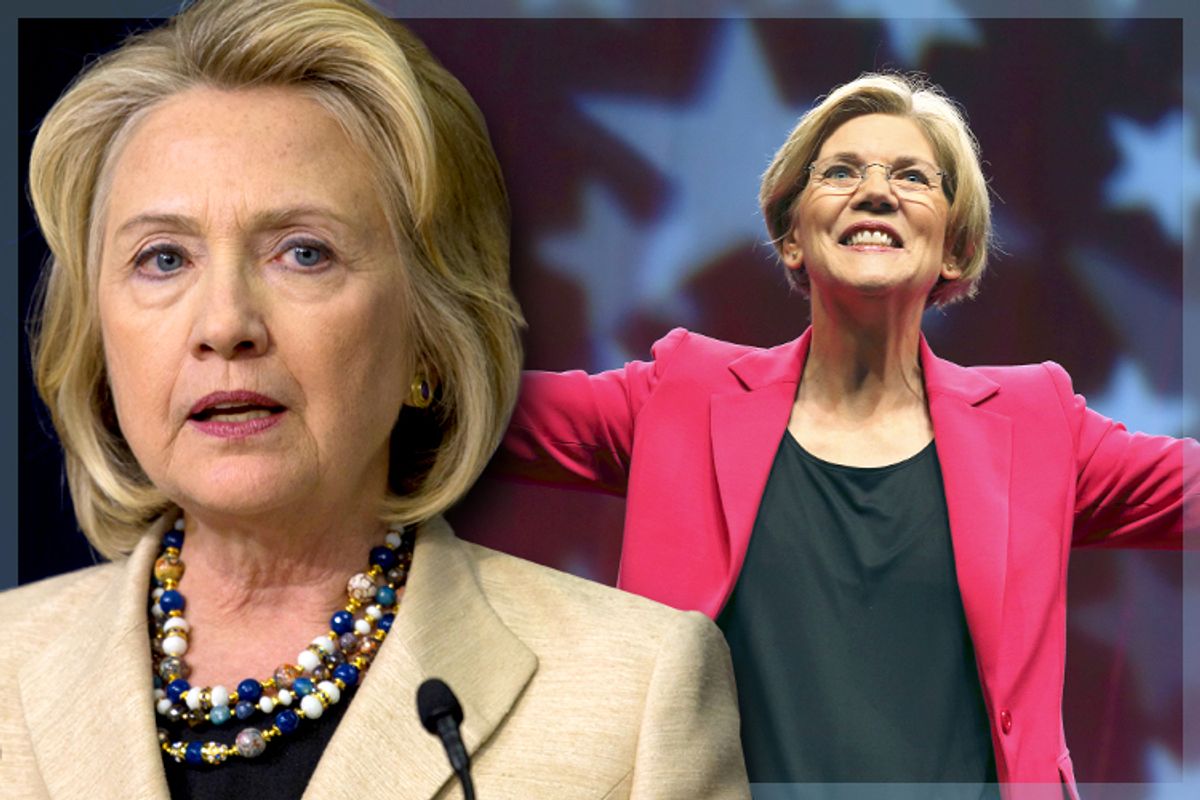Netroots Nation 2014, a gathering of liberal activists, is underway in Detroit. The schedule of panels on important issues sounds interesting, but hey, let's get down to more "pressing" matters: Are the people there going for Hillary Clinton or Elizabeth Warren!!?? (One of whom may not run, while the other almost certainly won't run.) This needs to be decided right now!
Politico has already pulled off the standard national media Netroots story, which is to go around asking various "bloggers" and activists and general liberal people what they think about Hillary Clinton. Do they like her? Can they put up with her? The answers may not surprise you.
• "I want to see [Clinton] run for president because I know she would win. Who would I really want to see run for president? Elizabeth Warren."
• "[Warren] has spoken so well about the issues that concern average Americans, she’s not too of-Wall Street. Hillary is too Wall Street and also too hawkish, but compared to any of the Republicans, she’s acceptable.”
• "Is [Clinton] the strongest possible candidate for the Democrats? Yes... [But Warren] captures the concerns of a lot of people in this country with economic security."
And so on and so forth.
This is essentially the same attitude toward Hillary Clinton reported out of Netroots Nation 2013: Fine, sure whatever. Wall Street/hawkishness bad, but she can win. And maybe, as The New Republic's Noam Scheiber recently observed in a story about how Hillary Clinton "won over the left," the next Democratic president needs to be more of a skilled, inside operator than the current one.
"One former Obama administration official quipped to me that it’s as if the Democratic Party has finally reached middle age," Scheiber wrote. "It’s not that liberals don’t perceive some ideological distance between themselves and Hillary Clinton, at least as they become more informed. Nor is it that they recognize this gap and simply don’t care about it. It’s that, after the somewhat disillusioning experience of the Obama years, many actually consider this gap an advantage for Clinton."
There are a couple of different, perfectly reasonable ways of looking at this middle-aging of liberals. One would be that it's terribly depressing that the main effect of the Obama years on the Democratic base's political thinking has been to prove that the presidency is not a mostly useful vehicle for change; all that matters is hoisting the nomination on whomever has the best shot of winning. The other is that this is a shrewd development: Change is going to rise up from public pressure, so you might as well put an experienced character in office who has a certain, uh, ideological flexibility to the shifting political winds.
The Politico piece notes that "this portion of the base’s lack of enthusiasm for Clinton echoes some of the same challenges she faced when she ran for president in 2008 and initially appeared inevitable — if out-of-step with progressives on financial and foreign policy matters — only to be eclipsed by Obama." That's a reasonable point. There's a lot of soft support behind Clinton -- although it's atop the hard support from the many, many Democrats who were on her side in 2008 and see 2016 as an opportunity for the party to make up its mistake.
But aside from all the other strengths Clinton enjoys now that she didn't leading up to the 2008 cycle is the fact that Democrats have controlled the White House for eight years already. It's hard for any party to win a third consecutive presidential election. One of Clinton's arguments against Obama in 2008 was that the Illinois senator was "unelectable." Nobody bought that; it was clear from about 2005 onward that whoever the Democrats nominated in 2008 would stroll into the White House. In 2016, electability should have a much stronger pull among the suddenly pragmatic, just-pick-a-winner Democratic electorate. For better or worse.

Shares